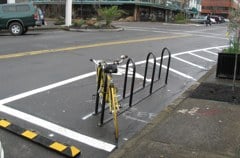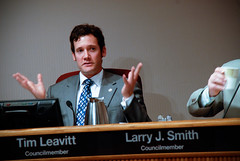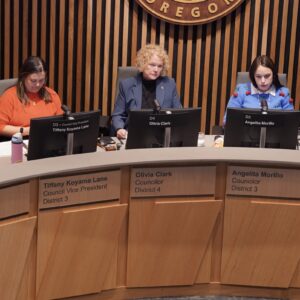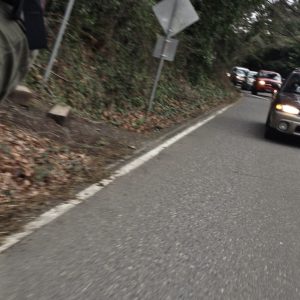Despite pressure from citizens, business owners (including the CEO of Burgerville), and advocacy groups from around the region and the country, last night the Vancouver City Council voted unanimously to pass their six-year Transportation Improvement Program plan with no dedicated funding for the Bike Program.
Instead of dedicated funds for bike infrastructure projects and encouragement programs, at a Council meeting last night, Mayor Tim Leavitt and Council members encouraged City staff to seek Federal grants and other funding sources. The decision came as a surprising disappointment for many.
“I am dismayed… to see a zero line item for bikes in the face of tens of millions …for widening lanes.”
— Gerik Kransky, BTA advocacy campaign manager, in testimony prior to the TIP vote.
“I am dismayed… to see a zero line item for bikes in the face of tens of millions …for widening lanes,” BTA advocacy campaign manager Gerik Kransky told Council before the TIP was approved, “I would ask that you start digging in the tens of millions you have and find something, anything, to fund the bike program.”
In her testimony, Bike Me! Vancouver leader Leah Jackson appealed to the Council’s long-term planning. “You need to look toward the future, and we know we won’t have enough space to accommodate just vehicles,” Jackson stated.
Kransky called the decision a “missed opportunity.” Kransky led a campaign to rally support to keep the Bike Program in the TIP, but to no avail. The BTA was joined in their efforts advocacy group Bike Me! Vancouver and the League of American Bicyclists even weighed into the issue with a letter to Vancouver’s Mayor urging him to find money to fund the program.
Prior to last night’s Council meeting, the President and CEO of Northwest food chain Burgerville, Jeff Harvey lent his support to the cause with a letter the Mayor Leavitt and Council members that stated in part:
“I realize the budget is tight but funding bicycling and pedestrian programs represents a critical investment in developing our desired future. Please make the necessary cuts elsewhere, and support the bicycle and pedestrian programs at or above the 2009 levels.”

in downtown Vancouver, like the on-street
bike corral on Main St.
(Photo: Jennifer Campos/City of Vancouver)
The City defends its decision as financially necessarily in tough economic times. “Fiscal responsibility” and “need to prioritize” were phrases used by several council members throughout the Council’s discussion.
It’s important to note that the TIP plan is not a budget document. Rather, it’s an outline of which capital projects the city will work on over a six-year period. With no dedicated revenue stream for their capital program, the City of Vancouver has traditionally relied on the general fund, bonds, and taxes to fund programs. Senior Transportation Planner Jennifer Campos recently explained that, “We have bonded all we can, so in 2010 our capital program essentially ends.”
With no capital program, Campos says that the Bike Program will be gone after this year, along with the City’s Sidewalk Program, ADA Curb Ramp Program, and their School Zone Safety Program.
City of Vancouver Transportation Planning Manager Matt Ransom, speaking after the meeting, said, “Our charge is to build the city system and the city system is not one dimensional.” Additionally, Ransom sought to clarify that zero funding for the stand alone bike program did not mean zero commitment to bike improvements. “The majority of bike lanes are built though major street upgrades. That is not going away,” Ransom stated.
For many Vancouver residents the frustrating aspect of the vote was how little money the Bike Program actually requires. The 2010-2015 TIP (approved last year) shows a line item funding of only fifty-thousand for the entire program.
“It’s so little money [for the bike program] and even that was too much to get from the city,” said long time Vancouver cyclist Mary Smith. “It’s frustrating to go through all this work to show support for a vital program and turn up empty handed.” Her feelings were echoed by Vancouver college student Jacob Ring, “It’s embarrassing, were advocating for crumbs and were not even getting that.”
— This story was filed by our Vancouver correspondent Marcus Griffith, with editing and additional details by Publisher Jonathan Maus.








Thanks for reading.
BikePortland has served this community with independent community journalism since 2005. We rely on subscriptions from readers like you to survive. Your financial support is vital in keeping this valuable resource alive and well.
Please subscribe today to strengthen and expand our work.
Well, I guess I couldn’t have picked a better time to head off to college. So long, Vancouver. Hello, Portland.
This is really a shame. I find it interesting that they couldn’t give the bike program even just a little bit. Even a little bit would have been appreciated. Now they just said, “No” instead of trying to work things out.
Well car registrations are down and bike usage is up. It makes perfect sense to vote this way. Fiscal responsibility?! Time to get that fellow Leavitt on a bike.
Kudos to Vancouver city hall for not spending money it dosen’t have, unlike portlands leaders
Kudos to Vancouver City Hall for dedicating more money, time and planning to an unsustainable, money-sucking, city-wrecking ideology of transportation planning.
I hope that Portland (and Oregon) has the political will to stand up on the CRC issue and not let this kind of transportation planning invade our side of the border. We like being able to walk and bike our city without fearing for our lives, thanks very much.
hence my choice of portland as a city to live in. vancouver, the shelbyville to portland’s springfield…
“…the Vancouver City Council voted unanimously to pass their six-year Transportation Improvement Program plan with no dedicated funding for the Bike Program.
…It’s important to note that the TIP plan is not a budget document. Rather, it’s an outline of which capital projects the city will work on over a six-year period.
…With no capital program, Campos says that the Bike Program will be gone after this year, along with the City’s Sidewalk Program, ADA Curb Ramp Program, and their School Zone Safety Program. …” bikeportland/griffith
It’s not just the bike program that’s being cut, but also those others, possibly more important than the bike program, that are being cut as well. What are the anticipated net effects on bike use as transportation, pedestrian infrastructure and school zone safety, from their not being included in the Vancouver TIP?
The Griffith story reports that Vancouver’s TIP isn’t a budget proposal, but only an outline for projects the city knows it has the money to work on for the next 6 years. What are some of those projects, and is it realistically possible for some of them to be cut back or reduced to reinstate the eliminated programs?
“… Mayor Tim Leavitt and Council members encouraged City staff to seek Federal grants and other funding sources. …” bikeportland/griffith
Which suggests that Leavitt and council are not opposed to further improvements to an increase in safe bike use of the Couv’s streets, but simply feel compelled to acknowledge that the city’s budget is strapped, and that the cut programs are the most responsible cuts to make. True?
what is very sad, is that I’ve seen more cyclists than ever in Vancouver over this last winter.
We still have opportunities to seek funding for bike improvements in Vancouver.
First, advocates should be following the upcoming capital budget process and asking for funding. This is the process of allocating local dollars to local projects. Excellent opportunity.
Second, track funded projects and ask about specific bike improvements in each and every one. Vancouver has plenty of money to spend on transportation, apparently it falls to us to push for complete streets on individual projects.
Third, support more federal funding for bikes regionally. Vancouver Councilmembers said they support federal funding and grants. Well, Metro Regional Government is looking at allocating $20-24 million at a meeting on July 8th. Check out page 209 of this document for details of the decision, deferred till July. http://bit.ly/ddqtvb Now is the time to write a letter to Jack Burkman and Steve Stuart asking them to support increased federal funding for bikes.
For shame… I’m curious to see the LAB’s response to this. Will they yank Vancouver’s BFC status? It seems like the award should be contingent on having a bike program.
They don’t need funding, cyclists are perfectly safe sharing the lane with cars on 4 lane roads that have 40 mph speed limits and no shoulder because they have a helmet law, and once you have that there is nothing left to do safety wise…
wsbob: you got the general idea right.
One of the statements made during the council discussion was: “There is no one here that would argue that bike program is not important” (I didn’t get which councilman said it). The issue was not about if City Council was aware of the value of bicyclists, but more if that awareness would translate into funding.
The Vancouver bike community has made leaps and bounds in the last 2 years. The bike project would have been helpful to keep around.
In the last week or so the city has been able to find $23 million for a new city hall, a few hundred thousand for furniture for the new building and about $160k to pay a parking company to take over parking management of a garage…. yet, a mere 50K for a bike project was not possible. Its tough to swallow that spending millions to save money is a good idea (which it is in the city hall case) but investing 50K to help make Vancouver a better place is not worth funding.
I would love to see things work out for the better, but after last night, I feel like the Vancouver bike community got patted on the head and dismissed with “thats nice, now go play in back yard”.
It was a disappointment that may take a few days to et over. On that note, there is MOCKTAILS on the I-5 bridge and a bicycling breakfast tomorrow (see Vancouver pedalplooza event details)
Awwww! Poor Obama supporters can’t get their stupid bicycle support… cut into your own pocketbooks!
Vancouver has spent enough on bicycle paths, etc.
Try to carry a couple bags of groceries
home when 1″ of rain is falling!
Hey, put a windmill or solar panel on the rear fender … that may get you home sooner!
Jerks!
Quickly on their way to becoming a “wrong side of the tracks” suburb of Portland.
What is the relationship between bike infrastructure funding and bike ridership/safety? Mies van der Rohe famously asserted that less be more. Could this be true at a regional scale in relatinoship to transportation infrastructure? As I listen to this week’s This American Life, Social Contract,
I am struck by the dire financial straits that many (or most) states and municipalities are in. We are in the middle of an accellerating collapse of the “Great Society” social contract, or perception thereof, wherein we look to the government to fund progressive programs which we, the general populus, deem desirable. It may be time to rethink the kneejerk reaction to this type of funding cut, thus diverting our energies and attention to resilient techniques for living in a less affluent society. To wit: How can we use and maintain the infrastructure we already have effectively and efficiently in a world of overextended natural and fiscal means? How can we avoid interacting with and/or supporting environmentally destructive infrastructure and practices. Could the solution is to build less of everything, including bike infrastructure, thereby inducing competitive demand for the already-overbuilt roads we already have? Perhaps it is time to reclaim full lanes of traffic rather than begging for separate bike facilities?
All us Vancouverites better just hang up our bikes. Cycling is over in Vancouver. Come on, people! This doesn’t mean they’re going to remove the bike lanes and close the streets to bikes.
It does make it more difficult to do some of the nice little neighborhood projects, and we lose the staff time required to design those projects. But it doesn’t remove the code requirements for bike lanes and facilities in new development and capitol improvements. All is not lost.
Hopefully when the budget recovers, and some of these projects that are consuming the bond cap in Vancouver are finished, they may have some money to throw at the bike program again. Or maybe they’ll find better ways to fund their projects, who knows.
Things are tight for cities these days. I dread to think what it will be like to bicycle after a few years of not repairing streets. We all need to be patient. “Was it over when the Germans bombed Pearl Harbor!” (Animal House reference)
q’Tzal
June 22nd, 2010 12:25
12
Quickly on their way to becoming a “wrong side of the tracks” suburb of Portland.
These kinds of sentiments remind me of high school. Grow up!
So what?
Portland has a bike plan that isn’t funded.
They have a idea of what it will cost, but no monies allocated.
Instead they are doing the usual rob Peter to pay Paul, by taking sewer fees to pay for bike infrastructure.
Is that any better than what Vancouver has done?
SteveD: You have the right attitude! The vast majority of cyclist in Vancouver I spoke too were disappointed but far from discouraged. As a rule, Vancouver cyclist are a dedicated bunch.
The next Bike Me! Vancouver meeting is Thursday, June 24th, 2010 at Woody’s Tacos (210 W. Evergreen Blvd., Suite 700, Vancouver). Bike Me! Vancouver is also proving bike parking at the Recycled Arts Festival.
I would agree that maybe the bigger issue is the other things that were cut – inner Portland at least has the advantage that most of it was built with sidewalks as a given. It also has the advantage that most roads were built small and left that way. I don’t think Vancouver has those advantages. Discouraging people from abandoning their cars helps Ford and GM, but I’m not so sure it helps Vancouver or its citizens.
Still, of course, cycling in Vancouver is not over. Power to the people! 🙂
SteveD
June 22nd, 2010 12:33
16
Grow up indeed!
Ever heard of that thing called “Peak Oil”
As has been repeated ad nauseum:
excerpt from wikipedia
Some observers, such as petroleum industry experts Kenneth S. Deffeyes and Matthew Simmons, believe the high dependence of most modern industrial transport, agricultural, and industrial systems on the relative low cost and high availability of oil will cause the post-peak production decline and possible severe increases in the price of oil to have negative implications for the global economy.
As the price and availability of oil prices our oil fueled life styles out of reach for the majority of people we will see more of what we saw starting in 2006 and 2008 where as heavily car dependent areas find their cost of transportation increasing unexpectedly they are unable afford their suburbian lifestyle. This did directly lead to foreclosures and will again. It will erode the tax base by emigration of tax paying citizens to places of higher density with better public transportation and more convenient and safe human power transport.
If Vancouver City Council is declaring that all their citizens will ever need is a car, as they are doing with their funding decision, they are dooming their town to a future reminiscent of the foreclosure riddled towns of Michigan. Nearly or completely abandoned areas turn in to ghettos quickly hence my “wrong side of the tracks” comment.
So our cities need to grow up and not out.
PS SteveD:
😛
Ethan:
Your point about self-reliance is all well and good, but I’d like to see that same standard held by motorists. Maybe they should not rely on the gubmint to fix their roads and widen their lanes either. Perhaps all drivers should tow around an asphalt machine behind their oversized, overpowered trucks, and just patch their own potholes. And teams of drivers could volunteer to install new traffic signals, or build bridges, etc.
“on their way to becoming….” lol
@ Mallory
I’m confused by your comments. Am I to believe that you consider all cyclists cry-baby OBama supporters? Wouldn’t you be alarmed if the local government decided not to invest in a service that you rely on to make ends meet? Those who commute by bike in Vancouver are concerned for the same reason. This isn’t a cry for a hobby being taken away, this isn’t about eliminating the planned budget for municipal tennis court maintenance. This is concern for cycling as a vital part of the local economy. Commuting by bike allows people to support local business, both at the bike shop and elsewhere with money saved by not spending it on gasoline.
If you aren’t concerned about having your budget impacted by a few hundred dollars a month, aren’t you concerned with where and how you spend your money?
With additional disposable income would you rather invest in the local economy, or give more money to the reckless oil barons?
Mallory’s a troll. ignore him. One never feeds the troll.
Hey Dennis, get your punctuation correct.
Never-the-less, neither Chris nor Dennis are sensible realists!
Go get your sleek show off garb and ride … to stay in Portland!
I’m out of this idiotic page.
Maybe Vantucky should stage a nude protest ride?
I agree, I think just one more naked bike ride or critical mass and they would have funded the bike program. Right…
When bicyclists seem to be mainly represented by these groups its no wonder that elected officials recoil somewhat. Talk about shooting yourself in the foot!
Classic.
Marcus Griffith, #18: The next Bike Me! Vancouver meeting is Thursday, June 24th, 2010 at Woody’s Tacos (210 W. Evergreen Blvd., Suite 700, Vancouver).
Update on the Bike Me! FB page says “Bicycle Alliance of Washington meet and greet. June 24th 5:30pm at Woody’s tacos.”
Why is everything blamed on the bad economy? If the economy is so bad, why can’t we send it to prison to be rehabilitated?
The only decent thing about Vanloser is it’s across the river from Portland.